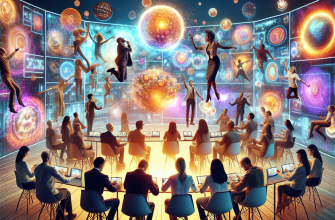- Exploring the Power of Immersive Marketing: How Brands Are Creating Memorable Experiences
- What is Immersive Marketing?
- The Rise of VR and AR in Brand Strategies
- Experiential Events: Beyond Digital
- The Psychological Impact of Immersive Experiences
- Customization and Personalization
- Challenges and Considerations
- The Future of Immersive Marketing
Exploring the Power of Immersive Marketing: How Brands Are Creating Memorable Experiences
In the ever-evolving landscape of digital marketing, brands are constantly seeking innovative ways to captivate audiences and create lasting impressions. One of the most dynamic strategies emerging in recent years is immersive marketing. This approach not only engages consumers but also envelops them in a brand-driven experience that’s both memorable and impactful. As a digital marketing expert, I’ve observed firsthand how immersive marketing can transform the traditional consumer-brand relationship into an interactive and enduring bond.
What is Immersive Marketing?
Immersive marketing refers to a strategy that utilizes a mix of digital technologies and physical experiences to create a deeply engaging environment for the consumer. This can range from virtual reality (VR) and augmented reality (AR) to interactive installations and experiential events. The goal is to create a sense of immersion that enhances the consumer’s connection to the brand through multi-sensory engagement.
The Rise of VR and AR in Brand Strategies
Virtual and augmented reality technologies have been game-changers in the realm of immersive marketing. VR allows users to step into a completely different world, a virtual space crafted by brands to convey their message or showcase their product in a fully immersive way. For instance, a real estate company might use VR to give potential buyers a virtual tour of a property, helping them visualize their life in a new home before it’s even built.
AR, on the other hand, brings an extra layer to the real world, enhancing the physical environment without creating a separate virtual reality. Brands like IKEA have leveraged AR to let customers visualize how furniture would look in their own homes via their smartphones, simplifying decision-making processes and enhancing customer satisfaction.
Experiential Events: Beyond Digital
While digital technologies are pivotal in immersive marketing, physical experiential events also play a crucial role. These events allow consumers to physically interact with a brand’s products or services in a curated environment. Pop-up experiences, interactive installations, and live demonstrations are just a few examples of how brands can engage consumers offline.
A notable example is the pop-up event by a popular beverage company that transformed an ordinary park into a branded beach, complete with sand, sun loungers, and free samples of their latest tropical drink. This not only created a relaxing and enjoyable environment but also a powerful brand association with leisure and pleasure in the minds of consumers.
The Psychological Impact of Immersive Experiences
The effectiveness of immersive marketing lies in its ability to tap into the human psyche. By engaging multiple senses, these experiences create more vivid, memorable interactions. The psychology behind this is simple: the more senses involved, the more likely the experience will be remembered and associated with positive emotions. This multisensory engagement leads to stronger emotional connections between the consumer and the brand, which is crucial for brand loyalty and advocacy.
Customization and Personalization
Immersive marketing also offers unique opportunities for customization and personalization. Through data analytics and interactive technologies, brands can tailor experiences to individual users, increasing relevance and personal connection. For instance, a fashion retailer might use an AR mirror that allows customers to see how different outfits look on them without physically trying them on, suggesting garments based on past purchases or browsing history.
Challenges and Considerations
Despite its many benefits, immersive marketing comes with its own set of challenges. High costs, technological dependencies, and the need for continuous innovation are significant hurdles. Moreover, brands must ensure that the technology enhances the experience without overshadowing the core message or product.
Privacy concerns are another critical issue, especially with experiences that collect personal data to customize interactions. Brands must navigate these concerns transparently, ensuring compliance with data protection regulations and building trust with their consumers.
The Future of Immersive Marketing
Looking ahead, immersive marketing is poised to grow even more sophisticated with advancements in AI, machine learning, and spatial computing. These technologies will make immersive experiences more adaptive and responsive, providing even deeper levels of engagement and personalization.
Moreover, as consumer expectations continue to rise, brands will need to keep innovating in this space to stay competitive. The future might see a blend of digital and physical worlds so seamless that the line between them becomes increasingly blurred, creating entirely new landscapes for marketing professionals to explore.
Immersive marketing represents a profound shift in how brands interact with their audiences. By creating memorable experiences that resonate on a deeply personal level, brands can foster lasting relationships and build strong emotional connections. As digital technologies continue to evolve, the potential for immersive marketing expands, offering exciting opportunities for brands willing to embrace this innovative approach. For marketers willing to invest in and explore the possibilities of immersive experiences, the rewards can be substantial in terms of customer engagement and brand loyalty.

A seasoned digital marketing strategist with over 8 years of experience across various areas of digital marketing, including SEO, SMM, PPC, content marketing, and email marketing. Specializes in transforming B2B, B2C, e-commerce, and SaaS businesses by creating effective go-to-market strategies and building thriving digital ecosystems. Known for a data-driven approach to optimizing campaigns and maximizing results.
“If your business is looking to scale or in need of a fresh perspective, feel free to contact”.





